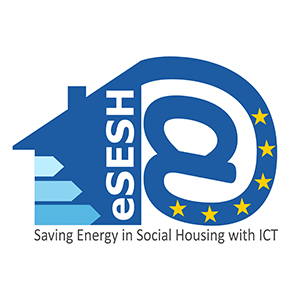In February 2013, the eSESH – Saving Energy in Social Housing with ICT project was successfully completed. The eSESH project started in March 2010 and aimed at helping Europe to meet emission targets by achieving a significant reduction of energy consumption in European social housing and to reduce energy poverty.
With the completion of the project numerous key conclusions are drawn. Each conclusion is accommodated with recommendations on how to achieve the particular result or correct a certain development, respectively.
In summary, key results of the project are that the eSESH solution can be applied in all circumstances and the services developed in the project (EMS / EAS) reduce cost of maintaining infrastructure while reducing waste of resources. In this regard, the Energy Management Service (EMS) can collect low-hanging fruit quickly – Energy Awareness Service (EAS) aiming at behavioural change is best suited for long-term strategies and benefits. The project successfully implemented service promotion online and offline: Advice given by trusted intermediaries is crucial for widespread success. Moreover, only tenants who have online access and feel confident in using online services can make full use of EAS type feedback on energy consumption. Do tenants not pay energy bills themselves, automated management (EMS) takes a larger share of savings.
Furthermore, the project showed that standard procedures for data exchange are still mostly limited to instances where the customer changes suppliers. It would be helpful, if a European body would certify equipment ensuring it to be compliant with Data Protection Law. Same applies to procedures to allow exchange of data between service providers as the local circumstances and responsibilities vary. In effect, this would also strengthen the common European market.
The project is financially supported by the European Commission under the ICT Policy Support Programme. In total, 35 organisations cooperated to provide ICT-based Energy Management and Energy Awareness Services directly to social housing tenants.
A detailed final report of the project can be found here: http://www.esesh.eu/outputs/
